The Ghost of Barbara Jordan

How different would the immigration debate look today had Barbara Jordan lived? It’s a question frequently pondered by those of us who believe the answer to every problem concerning immigration isn’t necessarily more immigration.
Jordan was the first woman elected to Congress from Texas and the first Southern black female ever elected to the House. She compiled a similar record of firsts in Texas state politics and was active in the civil rights movement. But Jordan capped her career chairing the U.S. Commission on Immigration Reform.
The commission’s vision of immigration reform was very different than the “comprehensive” variety pushed by a bipartisan gaggle of senators. To understand how different, consider Jordan’s contention in early 1995 congressional testimony that “deportation is crucial.”
“Credibility in immigration policy can be summed up in one sentence: those who should get in, get in; those who should be kept out, are kept out; and those who should not be here will be required to leave,” Jordan said. “The top priorities for detention and removal, of course, are criminal aliens. But for the system to be credible, people actually have to be deported at the end of the process.”
Today’s comprehensive immigration reformers think it is an abomination to deport anyone but criminal aliens. The Obama administration has celebrated such deportations while announcing that most of the remaining illegal immigrant population isn’t an enforcement priority.
In all, the Jordan Commission favored reducing legal immigration by one-third, moving towards more skill-based immigration and away from chain migration, and enhanced enforcement. One need not support all its recommendations—I oppose national ID cards, for instance—to see that serious alternatives to the Gang of Eight approach were once seriously contemplated by such mainstream Democrats as former President Bill Clinton.
Not long after Jordan’s untimely death in January 1996, the effects of her absence were felt. Liberals could not say no to immigration, whatever its impact on the working poor. Economic conservatives decided her commission’s worksite enforcement mechanisms were insufficiently pro-business; Beltway social conservatives regarded its changes to family reunification as insufficiently pro-family.
Since then, the country has been plagued by the notion that racism is the only possible motivation for reducing immigration or enforcing immigration laws. There were once courageous liberals like Jordan and to a lesser extent Theodore Hesburgh to whom it was impossible to ascribe such motives who were willing to argue otherwise.
Jordan observed that “it is both a right and a responsibility of a democratic society to manage immigration so that it serves the national interest,” which includes the interests of citizens of every race, and naturalized citizens as well as natives and the “nativists” supposedly advocating on their behalf. The shift from Jordan to Joe Arpaio as the public face of immigration enforcement made a more nuanced restrictionist case even more difficult to make.
Perhaps Jordan’s liberalism would have merely served those making the bizarre argument that conservative immigration restrictionists aren’t really conservative, that the pro-choice views of the obscure John Tanton somehow negate Tom Tancredo’s 100 percent pro-life ratings from the National Right to Life Committee.
Somehow, the liberalism of Chuck Schumer, Bob Mendendez, the National Council of La Raza, and the Ford Foundation never negates the conservatism of Republicans who work with these lawmakers and organizations to promote comprehensive immigration reform.
But it’s at least as likely that we would actually have an immigration debate rather than what has largely been a monologue, with the possibility of some federal legislators being able to quietly block a comprehensive bill lingering in the background as the only source of suspense.
Critics of uninterrupted mass immigration are currently relying upon lawmakers like Alabama Republican Sen. Jeff Sessions and Texas GOP Rep. Lamar Smith. Despite their considerable talents, both men are near-perfect foils for immigration increasers and amnesty advocates.
It’s possible that someone like Ted Cruz, the Texas Republican whose Cuban ancestry is similar to Marco Rubio’s while his take on the Gang of Eight machinations is markedly different, could shake up the prevailing narrative.
But nothing could challenge the conventional wisdom more than the reminding Americans that one could march against Jim Crow and advocate more moderate levels of immigration. A figure who could compellingly make that case is sadly missing from our national politics.
W. James Antle III is editor of the Daily Caller News Foundation and author of the newly released Devouring Freedom: Can Big Government Ever Be Stopped?
Comments